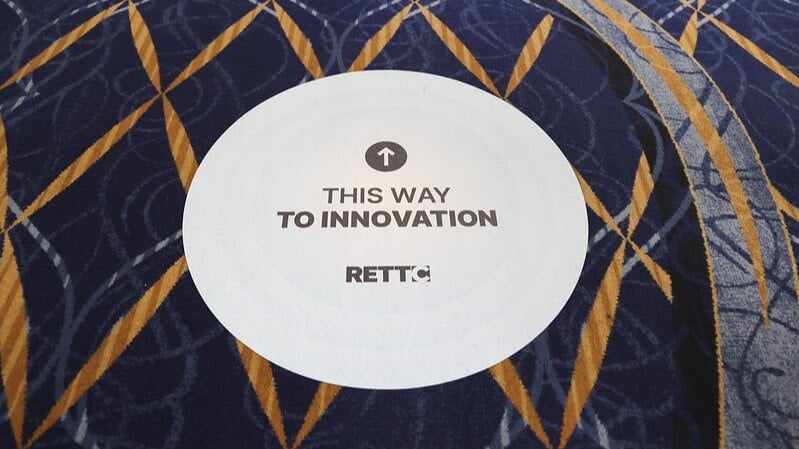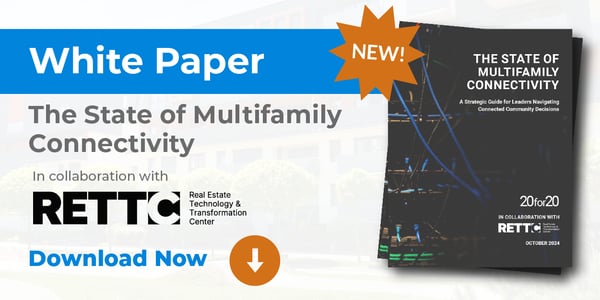
NMHC OPTECH 2024 is in the books, and what an event it was. As we noted last week, this year's was another record-setting crowd. As always, the event seemed to fly by. There is much to unpack, so this article will share thoughts on the launch of RETTC (pronounced "ret-see"), key technology themes that stood out, and finally, some reflections on the future of this excellent event.
The Arrival of RETTC
First, I must echo the overwhelmingly positive response to RETTC's launch. It's a huge achievement for Kevin Donnelly and his team. As the industry becomes more tech-enabled and regulators increasingly take assertive positions against multifamily operators and their suppliers, the time is right for NMHC to create a dedicated advocacy organization focused on the future of technology.
Over the last few months, I have been looking closely at two domains of technology that find themselves in the regulatory crosshairs: connectivity and revenue management. Both demonstrate how easily regulators can derail critical parts of our operating infrastructure. As the tech footprint grows, so will our need for advocacy. The arrival of RETTC is good news for our industry.
About the Technology
That brings me to the first technology topic that captured my attention during the show. I was thrilled to launch a new white paper, The State of Multifamily Connectivity, which was also the focus of a couple of sessions at this year's event. The key message in both sessions was this: connectivity forms the digital infrastructure of a multifamily community—a concept that many still don't fully grasp.
It is tempting to view Wi-Fi as an amenity, similar to kitchen appliances or upgraded flooring. However, demand for high-quality internet and faster speeds is growing along with the services it supports (think smart tech, EV charging, self-guided tours, etc.). Connectivity is now infrastructure and is increasingly crucial to the resident experience and operational efficiency in multifamily properties. The paper is therefore written to explain the core elements multifamily leaders need to understand as they make investment decisions about connectivity.
AI: the Long Game
AI, unsurprisingly, got a lot of coverage in this year's program, and not just because the event kickoff keynote featured an AI-powered robot! It was the subject of numerous panels that covered a range of applications, which are sounding more similar with each passing conference. Chat-based solutions, for example, are highly useful, but have been around since 2018 and are now firmly in the mainstream.
The coverage of Large Language Models (LLMs) like OpenAI at OPTECH seems to mirror questions in the broader economy about where the really big applications for this technology will come from. The use cases from panelists still seem to dwell on "It can write my emails for me.." types of applications. While such uses are, of course, useful, they are nowhere near the return we should expect on the astronomical investments the AI models have attracted. I remain optimistic about AI's long-term potential, and view the trend toward centralizing functions as the likeliest path to meaningful AI-driven transformation. However, the industry doesn't seem firmly on that path yet.
One panel took an interesting perspective on risk, specifically how implementing AI for property management functions transfers risk from human capital to software. That shifts mitigation strategies from how we train individuals to how we evaluate software. As one senior leader pointed out, that places a higher priority on assessing the viability of partners, especially when entrusting them with essential property management tasks. The same leader suggested that RETTC may become increasingly involved in helping the industry navigate the risks associated with these emerging technologies—a view that I also hold.
OPTECH Continues to Grow
OPTECH remains a hugely successful conference, invaluable to a growing number of participants each year. Last week's article detailing attendee breakdowns appears to have sparked a lot of discussion, notably, the observation of a 2:1 ratio of vendor to property management company attendees.
Some vendors took the analysis as evidence that the proportion of vendors is growing. But it clearly isn't: that ratio has been almost exactly the same for at least the last three years. And over each year the audience has been growing substantially, so there is no basis for believing that the ratio is a problem. Something close to the opposite is probably true.
The key to understanding OPTECH's value lies in recognizing it as the industry's premier tech supplier showcase. While vendors may not enjoy being surrounded by so many other suppliers, the show offers property management companies an efficient way to connect with many suppliers in one place, hear product pitches, and discuss new ideas (that last point is my personal favorite!)
The key is to understand that there is a time for pitching and a time to be respectful of people's space. Some of that is to do with suppliers' preparations and behavior: it is not hard to see, for example, how unsolicited pitches at breakfast or lunch tables do little other than antagonize their recipients. But there are also ways that the format could improve.
Nobody Asked Me, But:
Here are a few things that I would consider if I were running OPTECH:
- Facilitate pre-event education, e.g., survey, webinar, to help baseline attendee expectations and support preparations for the event. Done well, it could be a great piece of pre-event marketing.
- Help to minimize spam emails. It's a great idea to share attendee lists – it's the best way to facilitate so many meetings. However, some outreach guidelines may be helpful, including providing a way for attendees to report excessive unsolicited communications.
- Offer suppliers alternatives to trade show booths. While booths are valuable, they are expensive and have to be staffed, especially with companies balancing meetings outside the trade show floor. I hear the trade show was over-subscribed, so it may be more efficient to offer more lower-cost alternative ways for suppliers to plant their flag at the event.
- Leverage the work of industry content creators. I am struck at the growing gulf in quality between the output of the best independent content platforms and the panels at industry events. Panels have always been predicated on sharing precious slots between familiar faces and sponsors. The best podcasts in our industry, on the other hand, are pushing production values and analyzing results to understand what drives engagement. As competition continues to intensify between online platforms generating high-quality industry-specific content, and those sources make up more and more of our industry's media diet, OPTECH and all conference organizers should challenge themselves to leverage this expertise when they program their shows.
The above are suggestions and not criticisms. NMHC OPTECH remains an exceptional event, and the most relevant tech show on the multifamily calendar. As the baton passes to the new organization, I look forward to more innovation and to the first-ever "RETTC OPTECH," which will take place in Las Vegas next year.



